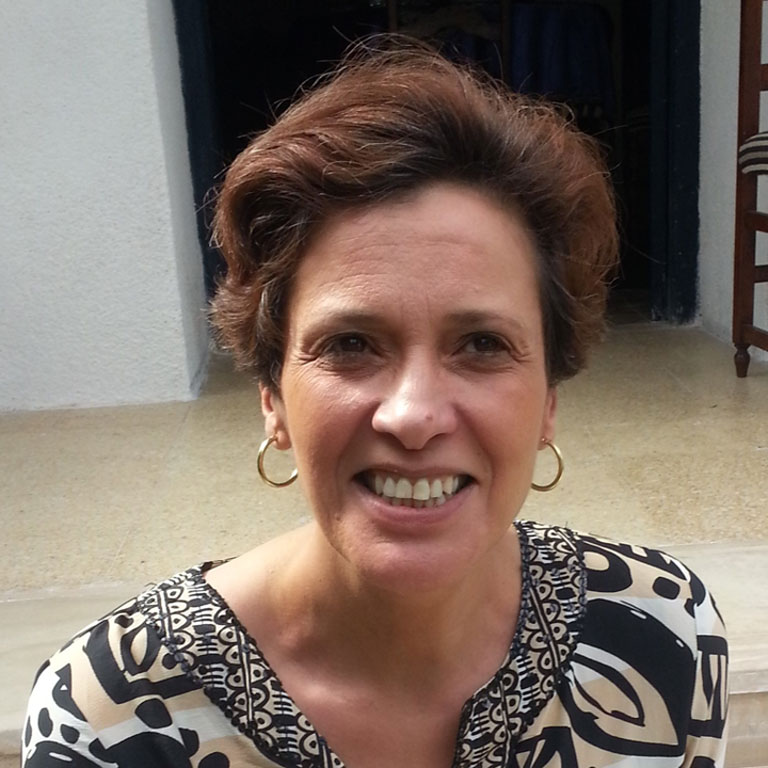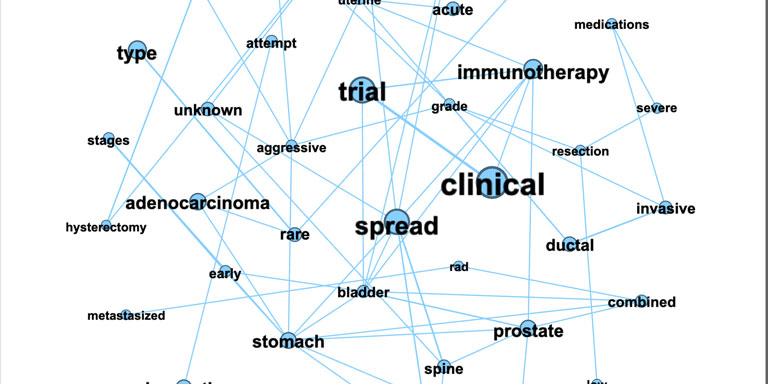For nearly 30 years, Zina Ben Miled has been using artificial intelligence to develop innovative solutions to issues impacting a variety of industries. But for Ben Miled, one crucial component has helped drive her success in pushing state-of-the-art advancements even further – partnerships.
“The key for me is working on a real problem that has a practical use that is going to be implemented and used, and partnerships make the definition of the problem and the deliverables unique,” said Ben Miled, an associate professor of electrical and computer engineering at IUPUI. “I know a lot about AI, but I do not always know much about the industry I’m working with. I learn a lot, and they learn a lot. That’s the exciting part for me.”
Ben Miled uses AI to develop complex models for prediction and works to understand how AI can be used to develop learning models that are able to deliver and achieve certain tasks.
“All of the projects I’m working on are trying to move toward a better understanding of how these models learn from their current environment to deliver the functions that will be necessary into the future,” Ben Miled said. “My long-term vision is to be able to develop adaptive machine learning models that can evolve over time, but we’re not there yet.”
Ongoing collaboration with Regenstrief Institute and Merck & Co., Inc., one of the largest pharmaceutical companies in the world, have allowed Ben Miled to apply her expertise to the health care industry.
In a five-year project funded by the National Institute of Health’s National Institute of Aging, Ben Miled is working with Dr. Malaz Boustani from the IU School of Medicine and Regenstrief and Dr. James Galvin of the University of Miami. They are using machine learning to develop a low-cost, scalable tool that can predict or identify patients who are at risk for developing Alzheimer’s disease. This model was initially developed in collaboration with Regenstrief Institute and Merck & Co., Inc. and was evaluated in a retrospective study of approximately 15,000 patients. Beginning this summer, it will be tested on actual patients to see if the results are validated in the field. Trials will be conducted at both Eskenazi Health and the University of Miami.
While MRIs and cognitive screening tests that measure memory capabilities of the patient can be used to screen for indicators of Alzheimer’s, the team’s tool – Passive Digital Marker – uses none of that. It draws from the actual history of the patient, using routine care data available in any patient’s record. It will be used as a pre-screening test, and if a person is identified as at-risk, they will then undergo additional screening.
Ben Miled says this tool can lead to early detection and is a cost-effective approach.
“If we can show this works for Alzheimer’s, then there is nothing that prevents us from using the same methodology for other diseases,” Ben Miled said. “If that becomes the case, you can just imagine the impact on a routine basis as patients are able to be screened for different types of diseases.”
Ben Miled has begun another project with Merck & Co., Inc., and the Regenstrief Institute to better understand a cancer patient’s journey through the use of online health forums, like Reddit, which allow patients and caregivers to share what they go through on a daily basis, information that may not be available in a clinical setting.
With more than 35,000 subscribers on the cancer subreddit alone, it simply isn’t possible for one person to review all of the postings manually. Instead, Ben Miled and her research partners are developing a machine learning model that recognizes the various aspects people experience – from sharing about side effects or major symptoms to understanding how caregivers cope.
“It’s so important to have a machine learning tool that can facilitate the transfer of that information into knowledge that is useful to scientists in an easy way,” Ben Miled said. “It can enhance our understanding of the burden of the disease, the concerns of the patients and their caregivers, as well as ascertain related quality of life changes.”
Ben Miled has also been actively involved in the manufacturing industry. She recently completed a project with Dow in which she utilized AI to predict outbound distribution delays in supply chains. IUPUI was one of two universities involved in the project. This project was funded by MxD, the nation’s digital manufacturing institute, and won a Manufacturing Leadership Award from the National Association of Manufacturers in 2020.
Ben Miled said this particular AI model was trained using historical shipment data provided by Dow (such as destination and type of shipment) and augmented with information from external sources, such as weather or road conditions. In the future, they will be able to use this information to build a model and expose it to new data, helping them mitigate event-based delays that challenge supply chain processes.
“This project highlights the potential for using AI in a practical setting, where you can attach an actual quantitative number in terms of a cost savings,” Ben Miled said. “Typically, suppliers or manufacturers have a penalty associated with a delay in their shipment, so if they can avoid those delays, it makes sense. It’s using a proactive approach rather than reactive thinking.”
AI isn’t limited to helping just with supply chain management, it also can be utilized to help with a variety of manufacturing needs. For the last three years, Ben Miled has worked with Allison Transmission, Inc. to create machine-learning models that can estimate the fuel consumption of heavy-duty vehicles, such as school buses or tractor trailers.
For companies that do road testing of vehicles to understand how fuel consumption changes based on the road conditions, testing can be a costly process. An AI model is much more cost-effective, by predicting all of that behavior in the lab.
“This information can be used primarily in the design process to help improve future design or components of the vehicles,” Ben Miled said. “It provides an understanding of the impact of road conditions, or how certain environments can impact the fuel consumption of vehicles. It can also be used to optimize fuel consumption for large fleets by assigning each vehicle to the right task and route.”
Over the years, Ben Miled has seen the use of AI grow. Years ago, researchers were faced with limitations on the availability of large-scale data and the computational power available in their labs. Now, the field has evolved so much that researchers like Ben Miled are able to see their projects actually used in the field.
“With some of my goals for AI, these visions will not be achievable in my lifetime,” said Ben Miled, who hopes her students currently employed by companies such as Eli Lilly & Co, Allison Transmission, Inc. and Google will help progress her vision. “I think AI will continue to grow and people will be more accepting of it.”





